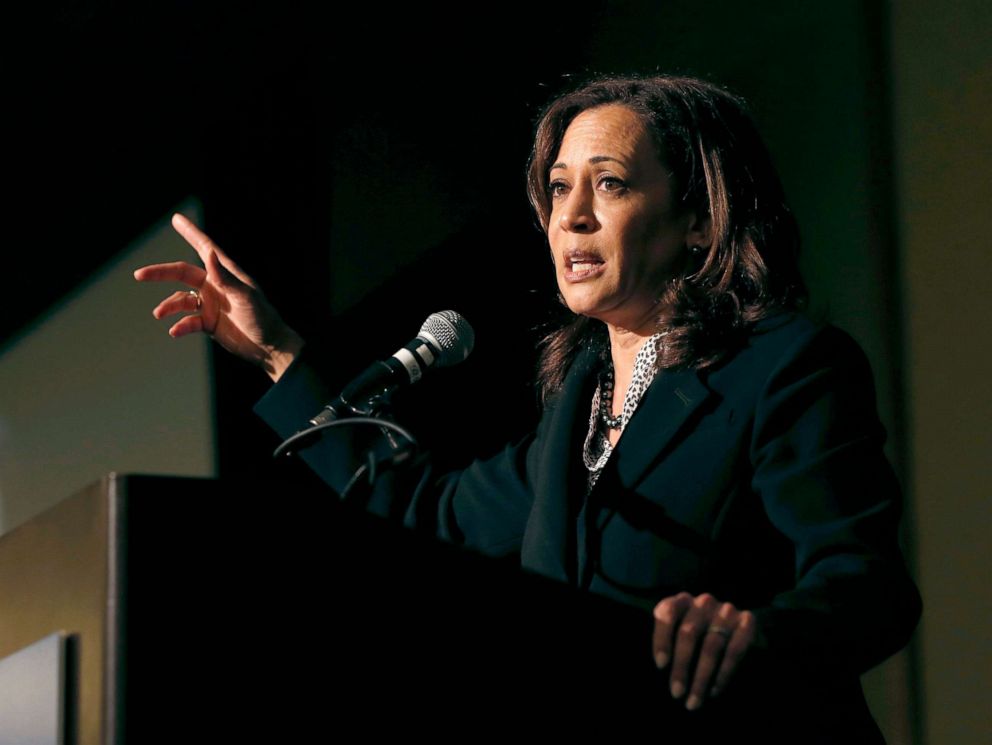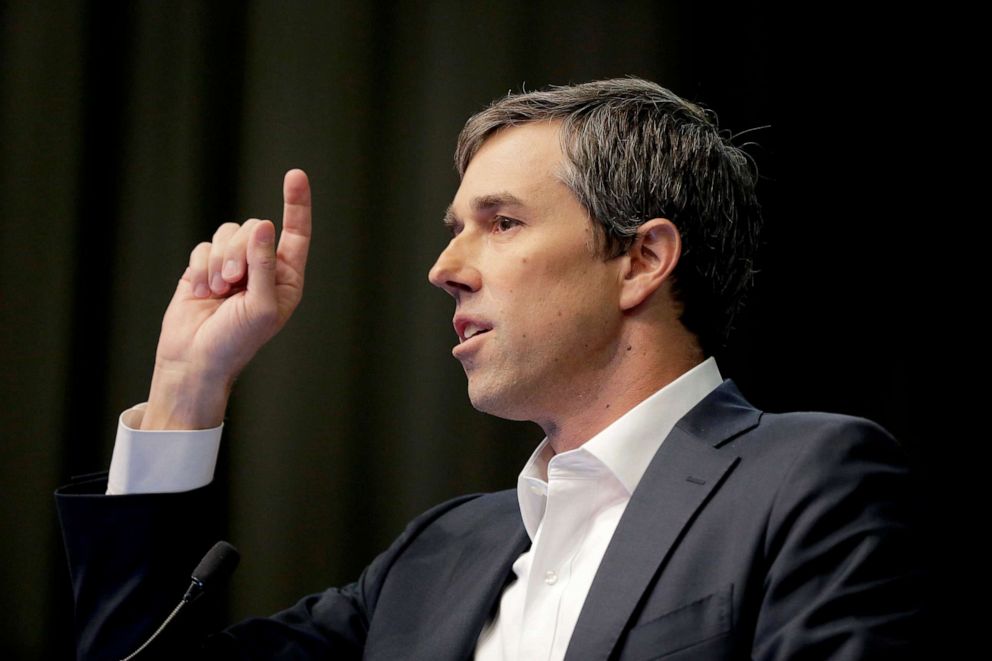2020 candidates spotlight criminal justice reform and income inequality at final day of National Action Network convention
Democratic presidential candidates try to connect with black voters.
A handful of 2020 Democratic presidential hopefuls closed out Al Sharpton's National Action Network's annual convention in New York City on Friday attempting to win over black voters, a crucial demographic in winning the upcoming primary election.
In the South, African Americans account for a majority of Democratic primary voters, according to Andra Gillespie, an associate professor of political science at Emory University.
"You need those delegates in order to be able to clinch the nomination," Gillespie told ABC News.
Among the convention speakers were Sens. Kamala Harris, Cory Booker, Bernie Sanders, Elizabeth Warren, Kirsten Gillibrand, Amy Klobuchar and Colorado Gov. John Hickenlooper.
Criminal justice reform was one of the main topics during the first days of the convention, and gave Harris the chance to outline her plan on the issue, despite criticism she's faced that linked to her tenure as California's attorney general and district attorney of San Francisco.
During her speech, the senator touted her record as the top cop in California and said her experience would guide her at the helms of Department of Justice. She called for doubling the size of the civil rights division in the department, increasing patterns and practice investigations, and enforcing consent decrees.
On the stage, she focused on the issue of mass incarceration while slamming the Trump administration for favoring private prisons.
“When this country incarcerates more people than any other country, America must admit it has a problem of mass incarceration. But what has this administration done, they've increased the use of private prisons, which as we all know, profit, not, let's be clear about this profit over the incarceration of other human beings," she said.
Harris has described herself as a "progressive prosecutor" during that portion of her career, but in a January New York Times op-ed, the senator was accused of staying silent when urged to embrace reforms.
"Ms. Harris fought tooth and nail to uphold wrongful convictions that had been secured through official misconduct that included evidence tampering, false testimony and the suppression of crucial information by prosecutors," wrote Lara Bazelon, a University of San Francisco law professor.

Sen. Cory Booker, D-N.J., an ardent supporter of criminal justice reform and an original co-sponsor of the First Step Act, said he hopes to "get back to a country being about substance and not just sentiment."
"We are dealing with systematic injustice in this country," he said, as one of the only candidates to receive a standing ovation at the conference on its final day. “What will happen to the dream of America on our watch? The dream of slaves for freedom? The dreams of suffragettes…what will become the dream of our nation?”
Klobuchar, another First Step Act co-sponsor, echoed those sentiments but underscored the need for economic justice.
"We cannot have racial justice, without economic justice, and that means schools that work for kids in every neighborhood in this country," she said, as she pitched her support for criminal justice reform, suggesting that although President Trump signed the criminal justice reform bill into law, more needs to be done.
Earlier this week, presidential candidates Beto O'Rourke, Pete Buttigieg and Julian Castro all said criminal justice reform was needed in the United States and also called for the legalization of marijuana and reparations for slavery.
"The country will never fully heal until we address the original sin of slavery," said Castro, who served as secretary of Housing and Urban Development under President Barack Obama.

Buttigieg said that as president he would support a reparations bill, which he sees as an issue of "inter-generational injustice."
On Friday, Sanders and Warren, two of the most progressive allies in the deep 2020 field, weighed in on some of the bigger reform issues, like reparations for African Americans and reforming the Senate filibuster.
The Vermont Senator spoke about the “horrific” level of income and wealth disparity, focusing on how it relates to the African American community.
“That is unacceptable," he said of the pay gap between black women and men to an applauding audience. "Equal pay for equal work, whether you’re black or white, male or female, equal pay for equal work.”
But on the issue of reparations, after coming under fire last month for declining to support a reparations bill in Congress, telling ABC’s “The View”, “I think that right now, our job is to address the crises facing the American people and our communities, and I think there are better ways to do that than just writing out a check,” Sanders seemed to walk back his position Friday.
"If the House and Senate pass that bill, of course I would sign it," he said, before adding that he thought there needed to be study about reparations. Gillibrand also said at the conference that she supports legislation to study reparations.
"This is a conversation that is long overdue," she said.
Warren, who has rolled out an ambitious platform of policies since announcing her candidacy, spoke about her proposal to end the Senate filibuster.
"For generations, the filibuster was used as a tool to block progress on racial justice, and in the recent years, it's been used by the far right as a tool to block progress on everything," she said.
As an example, she talked about a Senate bill that was passed last year that would make lynching a federal crime. The bill was passed by the house in 1922, but was filibustered over and over again by the Senate.
"We can't sit around for 100 years while climate change destroys this planet. We can't sit around for 100 years while corruption pervades every nook and cranny of Washington," she added.
A national Quinnipiac University poll of Democratic 2020 hopefuls shows Harris struggling to connect with black voters, garnering just 8% support from that demographic, well behind former Vice President Joe Biden's field-leading 44%.
Biden is contending with multiple accusations from women of inappropriate touching, as he nearly embarks on his widely anticipated presidential campaign.
In a gaggle with reporters outside the event, the latest White House hopeful to enter the race, Rep. Tim Ryan, D-Ohio, sidestepped questions about the allegations against Biden.
"That’s for the voters to decide,” he said.
With 10 months until the first primary and an ever-growing field of candidates, some attending the conference have said that they have plenty of choices and plenty of time to decide whom to endorse.
Denise Hawley, who attended the conference on Wednesday and Thursday said, "I want to hear and listen what everyone has to say, and if it's good for me and it's good for them, we got it."
Patricia Elaine, a native New Yorker, told ABC News on the final day of the convention, "I like some ideas she has about equality."
She added that she ultimately supports a Biden and Warren ticket for the general election.
Elaine defended the former vice president amid his recent allegations using herself as an example of being "a touchy-feely person too."
"I think that's just his personality," Elaine said but added that he has to "adjust" to the new time that we're living in.
ABC News' Kendall Karson contributed to this report.




